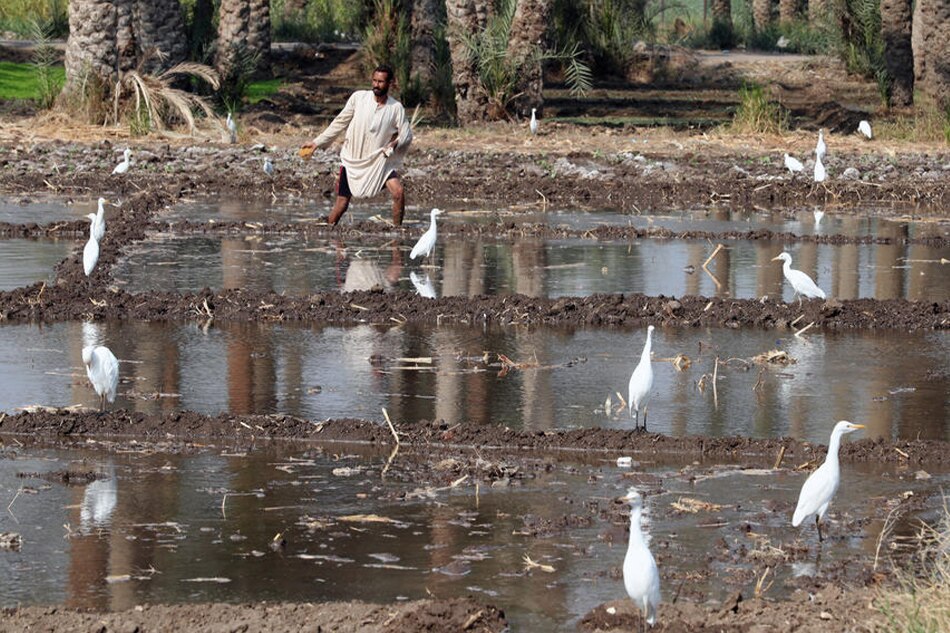Mideast at risk of climate-induced food, water scarcity: report | ABS-CBN

Welcome, Kapamilya! We use cookies to improve your browsing experience. Continuing to use this site means you agree to our use of cookies. Tell me more!
Mideast at risk of climate-induced food, water scarcity: report
Mideast at risk of climate-induced food, water scarcity: report
Agence France-Presse
Published Nov 03, 2022 04:27 AM PHT
|
Updated Nov 03, 2022 06:26 AM PHT
The Middle East is at high risk of water and food scarcity as well as severe heat waves as a result of climate change, said a Greenpeace study released Wednesday.
The Middle East is at high risk of water and food scarcity as well as severe heat waves as a result of climate change, said a Greenpeace study released Wednesday.
Published only days ahead of the UN climate conference in Egypt, the report titled "Living on The Edge" focused on Algeria, Egypt, Lebanon, Morocco, Tunisia and the United Arab Emirates.
Published only days ahead of the UN climate conference in Egypt, the report titled "Living on The Edge" focused on Algeria, Egypt, Lebanon, Morocco, Tunisia and the United Arab Emirates.
It found the Middle East is warming nearly twice as fast as the global average, making its food and water supplies "extremely vulnerable" to climate change.
It found the Middle East is warming nearly twice as fast as the global average, making its food and water supplies "extremely vulnerable" to climate change.
"In all six countries discussed in this report, there will be a very high risk of water scarcity in all regions, which will negatively affect agriculture and human health," the report said.
"In all six countries discussed in this report, there will be a very high risk of water scarcity in all regions, which will negatively affect agriculture and human health," the report said.
ADVERTISEMENT
Drought and water scarcity could impact crop yields in future decades, which will exacerbate reliance on food imports, the report added.
Drought and water scarcity could impact crop yields in future decades, which will exacerbate reliance on food imports, the report added.
"The region as a whole is warming fast, with an accelerated rate of 0.4 degrees Celsius per decade since the 1980s -– nearly twice the global average," Kathryn Miller, science consultant at Greenpeace Research Laboratories said in a statement.
"The region as a whole is warming fast, with an accelerated rate of 0.4 degrees Celsius per decade since the 1980s -– nearly twice the global average," Kathryn Miller, science consultant at Greenpeace Research Laboratories said in a statement.
By the end of the century, 80 percent of the densely populated cities in the Middle East and North Africa were likely to suffer from heat waves for at least 50 percent of the warm season, the report said.
By the end of the century, 80 percent of the densely populated cities in the Middle East and North Africa were likely to suffer from heat waves for at least 50 percent of the warm season, the report said.
In some locations, including in the Gulf region, peak temperatures during extreme future heatwaves could exceed 56 degrees Celsius.
In some locations, including in the Gulf region, peak temperatures during extreme future heatwaves could exceed 56 degrees Celsius.
Already, the consequences are being felt.
Already, the consequences are being felt.
"Lives are being lost, homes destroyed, crops are failing, livelihoods are jeopardised and cultural heritage is being wiped out," said Greenpeace regional director Ghiwa Nakat.
"Lives are being lost, homes destroyed, crops are failing, livelihoods are jeopardised and cultural heritage is being wiped out," said Greenpeace regional director Ghiwa Nakat.
"It is absolutely vital that we transition away from fossil fuels and move towards energy independence," Nakat said.
"It is absolutely vital that we transition away from fossil fuels and move towards energy independence," Nakat said.
Major oil exporters including the UAE and Saudi Arabia argue in favour of continued investment in fossil fuels to fund the transition to clean energy.
Major oil exporters including the UAE and Saudi Arabia argue in favour of continued investment in fossil fuels to fund the transition to clean energy.
The Greenpeace study came before UN's COP27 climate conference opens in Egypt on Sunday.
The Greenpeace study came before UN's COP27 climate conference opens in Egypt on Sunday.
Representatives from nearly 200 countries will take part in the latest round of climate negotiations.
Representatives from nearly 200 countries will take part in the latest round of climate negotiations.
COP26 last year ended with a pledge to keep global warming at 1.5 degrees Celsius over pre-industrial levels -- a goal the world is set to miss on current emission trends.
COP26 last year ended with a pledge to keep global warming at 1.5 degrees Celsius over pre-industrial levels -- a goal the world is set to miss on current emission trends.
RELATED VIDEO
ADVERTISEMENT
ADVERTISEMENT


